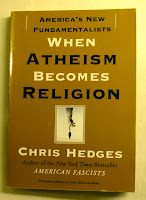 This is a book with one message only, but an important one. Many prominent atheists today blame religion for the worst of human depravity, superstition and ignorance. They claim that once we free ourselves from religion we will be able to march forward as a species to their utopia. They are using the evil of many religious institutions to condemn faith in God itself. They have curiously ignore those who found through their faith the strength to stand up against injustice.
This is a book with one message only, but an important one. Many prominent atheists today blame religion for the worst of human depravity, superstition and ignorance. They claim that once we free ourselves from religion we will be able to march forward as a species to their utopia. They are using the evil of many religious institutions to condemn faith in God itself. They have curiously ignore those who found through their faith the strength to stand up against injustice.A belief in the limitless possibilities of science, and the belief that science will save us from ourselves, has replaced, for many, faith in God. Evil, however, cannot be eradicated through education. Knowledge brings with it benefits, including self-awareness and power. But it also tempts us to play God. New technologies can be used to wage war and strengthen tyranny. The worst tyrannies in human history were actually carried out by utopian idealists. There is no reason to believe that science can help us become more moral. Science is, at best, neutral in this regard.
The author, Chris Hedges, believes in sin. Sin as acknowledgement that “we can never be omnipotent, that we are bound and limited by human flaws and self-interest. ... The concept of sin is a check on the utopian dreams of a perfect world. It prevents us from believing ... that the material advances of science and technology equal an intrinsic moral improvement in our species.”
Hedges is as critical of religious fundamentalists as of atheists. This book is somewhat repetitive, in the way that it argues for the message in its title in each chapter, from a variety of perspectives. But it is worth reading because of the importance of the message. It is quite short and easy to read.
No comments:
Post a Comment